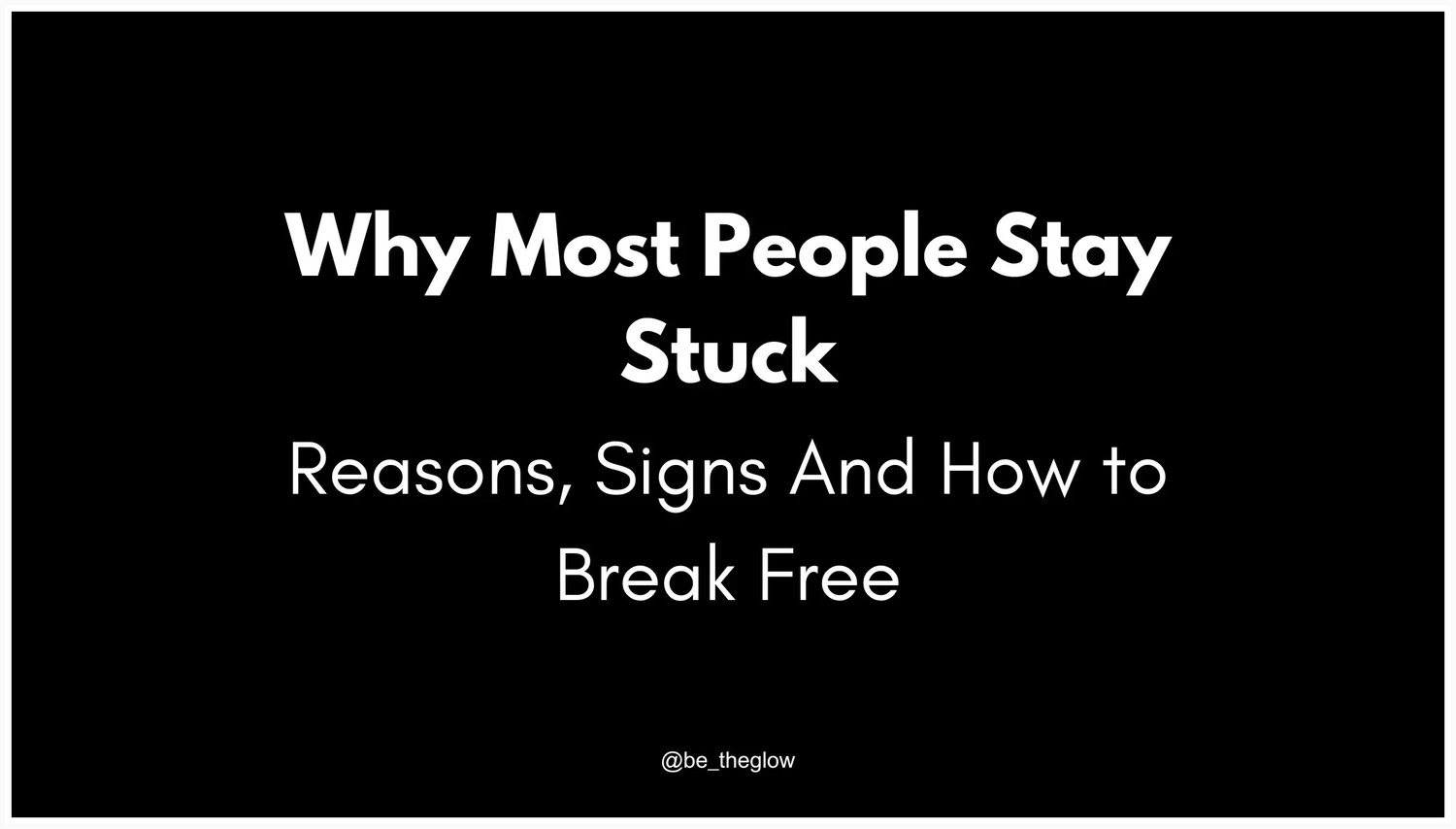Why do some people move forward while others feel trapped in the same place for years? Many people think it’s because of bad luck or lack of talent. But research shows that the real reason is often the way people think and act. Feeling stuck is a common problem. Studies show that people who feel stuck often experience higher levels of stress, anxiety, and frustration. But the good news is, there are clear, proven steps you can take to break free and start moving forward.
In this article, we will explore why people stay stuck, how it affects your mind and life, and the practical steps based on real psychological studies and research that show what actually works and how to break free.
Why People Stay Stuck
Many people feel stuck without knowing exactly why. Understanding the reasons behind this feeling is the first step to escaping it. Here are some of the most common reasons people stay trapped:
- Fear of Change: Change can feel scary. According to research published in the Journal of Anxiety Disorders, fear of the unknown can activate the brain’s amygdala, the part responsible for processing fear. This makes people feel anxious when they think about changing their lives. Even when life is not perfect, staying the same feels safer because it is familiar. People often worry that if they make a change, things could get worse. But staying in the same place means no progress and no new opportunities.
- Overthinking Everything: Thinking too much can stop you from taking action. Psychologists call this "analysis paralysis." A study from the Journal of Behavioral Decision Making shows that when people overanalyze decisions, they become less likely to act. People who overthink often worry about making mistakes or choosing the wrong path. This endless cycle of thoughts makes it harder to move forward and keeps people stuck in the same situation.
- Waiting for the "Right Time": Many people believe that they need to wait until the perfect moment to make a change. But research from Harvard Business Review shows that successful people take action even when conditions are not perfect. The truth is, there is no perfect time. Waiting often turns into years of inaction. Taking small steps now is better than waiting for the ideal moment that may never come.
- Fear of Failure: Failure is often seen as something to avoid, but studies from The Journal of Experimental Psychology suggest that failure is a natural part of learning. People who fear failure often avoid trying new things. This prevents growth and keeps them stuck. What most people don't realize is that every successful person has failed many times before reaching their goals.
- Comfort Zones: Comfort feels safe, but it also limits growth. Research in the Personality and Social Psychology Bulletin shows that people who stay in their comfort zones miss out on new experiences and opportunities. While comfort may feel good in the short term, it often leads to long-term dissatisfaction and regret.
Signs You Are Stuck
It can be hard to recognize when you are stuck. Here are some clear signs that your life may be on pause:
Every day feels the same: You feel like nothing changes, no matter what you do.
- Lack of motivation: You find it hard to feel excited about your goals or future.
- Avoiding new challenges: You stick to what is familiar and avoid trying new things.
- Feeling tired all the time: Mental and emotional exhaustion are common when you feel stuck.
- Constantly wishing for a different life: You daydream about a better life but do nothing to create it.
If these signs sound familiar, it is time to take action and start moving forward.
How to Break Free
Breaking free from feeling stuck is possible. Science shows that small, consistent changes in your behavior and mindset can help you move forward. Here are practical steps backed by research to help you break free:
- Take Small Steps: Research from Stanford University shows that small actions are easier to maintain and lead to long-term change. Instead of trying to change everything at once, focus on one small step. For example, if you want to change your career, start by researching new fields for 10 minutes a day. Small steps build momentum and make big goals feel manageable.
- Face Fear Directly: Studies from Cognitive Therapy and Research show that the best way to overcome fear is to face it gradually. Avoiding fear makes it stronger. If you fear public speaking, start by practicing in front of a mirror or a small group. Facing your fears in small doses helps your brain realize that the danger is not as big as it seems.
- Stop Waiting for the "Right Time": Psychologists agree that action creates clarity. Instead of waiting for the perfect moment, start now with what you have. If you want to start a business, begin by writing down your ideas today. Action, even when it feels small, builds confidence and reduces fear.
- Change Your Environment: Your surroundings affect your mindset. Research from Environmental Psychology shows that a new environment can boost creativity and motivation. If you feel stuck, try working in a new place, meeting new people, or changing your daily routine. Small environmental shifts can inspire fresh thinking.
A Simple Action Plan to Start Today
- Identify one area where you feel stuck.
- Write down one small step you can take today.
- Take that step, no matter how small.
- Repeat this process every day for the next 7 days.
- Reflect on your progress and adjust as needed.
Final Thought
Many people have felt stuck and found a way to move forward. The difference between those who stay stuck and those who break free is action. You have the power to change your life, one small step at a time. Your future is waiting. The question is: Will you take the first step today?
Join Be The Glow On Social Media :
Be The Glow.



Comments ()